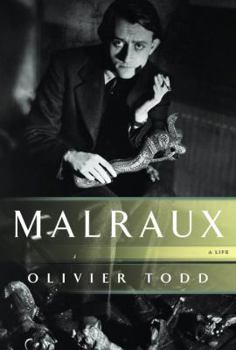Malraux: A Life
Writer, Publisher, War Hero, French government minister, Andre Malraux was renowned as a Renaissance man of the twentieth century. Now, Olivier Todd-author of the acclaimed biography Albert... This description may be from another edition of this product.
Format:Hardcover
Language:English
ISBN:0375407022
ISBN13:9780375407024
Release Date:February 2005
Publisher:Alfred A. Knopf
Length:541 Pages
Weight:2.25 lbs.
Dimensions:1.8" x 6.5" x 9.7"
Customer Reviews
2 ratings
The Hero
Published by Thriftbooks.com User , 17 years ago
This is the story of a bogus hero. Malraux was a great character who presented himself to the world as a great hero. Some of his exploits were misrepresented by him. Some of them never happened. A few were almost as he described them. It must be noted that he did have an interesting life. He was a real adventurer who took real risks. Nevertheless, his life was not much like the life he claimed or implied. He always seemed to be a con-man or fabulist. He was not a nice person either. His reputation is based his writing which was actually quite good. A number of his books are still read with enjoyment. Afew are still highly regarded. Now that it has long been established that he was not really the model for his fictional protagonists, it is possible to enjoy his books for what they are. The author views Malraux's life with a jaundiced eye, perhaps too jaundiced. Nevertheless, this is a well-done view of an author who appeared, in his day, to have rock star qualities. in addition, Malraux's novels have survived his nonsense in reasonably good shape.
'Malraux' hovers between hagiography and hatchet job
Published by Thriftbooks.com User , 19 years ago
Olivier Todd, who lives in Paris, is the author of numerous books--including novels, essay collections, and biographies, such as his highly acclaimed Albert Camus: A Life (Knopf, 1997). In Malraux: A Life, Todd has written another impressively researched biography. Andre Malraux (1901-1976) was one of the greatest French writers of the 20th century. An autodidact, he was an omnivorous reader, devouring works of literature, history, philosophy, and art as a starving man devours food. A man of action as well as a man of intellect, Malraux was one of those rare individuals whose life combined adventure and creativity. His works include The Temptation of the West (1926), The Conquerors (1828), The Royal Way (1930), Man's Fate (1934) Days of Wrath (1935), Man's Hope (1938), The Psychology of Art (1947-1949), The Voices of Silence (1953), Anti-Memoirs (1967), and Felled Oaks (1971). Malraux suffered from Tourette's syndrome, a rare inherited neurological disease characterized by recurrent motor and phonic tics (involuntary muscle spasms and vocalizations). "Malraux forged an exceptional life for himself," writes Todd, "not because of but despite and in opposition to his nervous tics. Like Mozart, Samuel Johnson, Emile Zola, and Franz Kafka, who also had to compromise with their Tourette's syndrome, Malraux overcompensated and dominated his physical difficulties." A world traveler, Malraux sought adventures to give him grist for his writing mill. Fascinated by the East, he visited Indochina, China, Japan, Russia, and India. He was arrested and almost imprisoned for stealing a bas relief from the temple at Bantai Srey, Cambodia. He fought against the fascists in the Spanish Civil War and against the Nazis in the French resistance. Although not the second Lawrence of Arabia he envisioned himself to be, Malraux was both a man of culture and a man of action. When Malraux engineered the loan of La Gioconda (the Mona Lisa) to an art gallery in the United States, John F. Kennedy said, "Malraux has revived the ideal of the Renaissance ... a writer, a philosopher, a statesman, and a soldier. He has demonstrated that politics and art, the life of action and the life of thought, the world of events and the world of the imagination are one." Todd comments: "John Kennedy does not believe a word of what he says. But is designed to please Malraux." Malraux often spoke of himself as "a religious mind without faith," a description that also characterizes Nietzsche. Such a "spirituality" is in no way connected with ecclesiastical orthodoxy; one must understand the phrase not in a metaphysical, but in an aesthetic sense, with a healthy dose of depth psychology thrown in for good measure. Deeply influenced by Nietzsche's "the death of God" (some would say "the death of the Absolute"), Malraux was troubled by the advance of nihilism and the relativity of cultures. He sallied forth in a quixotic quest for the Absolute (sans deity), first in revolution, then in Art (wi






